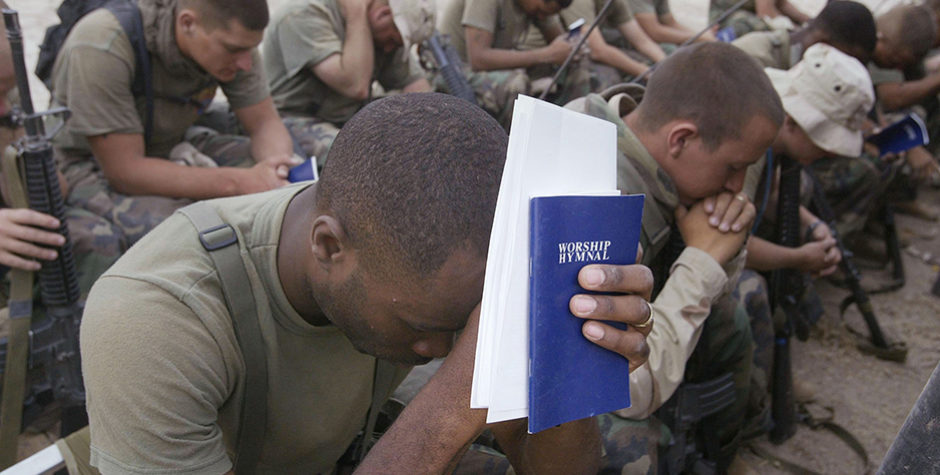The Attack on Religion in the Military Continues
There are several litigious organizations whose declared purpose is to eliminate any expression of religion from the cultural landscape of America. Their attack on religion is relentless; they grasp every opportunity to silence free speech if that speech does not align with their agendas. However, their attacks on any religious speech is even more venomous. They not only take a stand against religious language or religious references in the public square, they also frequently oppose people who are either in public office, or who are invited to address those who serve, simply if that person is privately and personally a religious person. It seems if one is a person of faith, they have a target placed on their back by these groups.
This is especially true for those who serve in the United States Armed Forces. The free exercise of religion is a critical constitutional right for those who wear the uniform. It is an all-volunteer force made up of men and women who frequently serve in isolated places and deploy to various regions of the world where they are far from their families and far from the support of their churches, synagogues, and so forth. This reality is why the courts have upheld the established chaplaincies in all branches of the military.
These same groups that attack religion have repeatedly tried to abolish chaplains in the armed forces. Having failed to do that, they continually seek to harass and inhibit the chaplains who serve our men and women in uniform. Even though chaplains are recruited to provide religious services, they also are the appointed officers in every military unit who are the guarantors of the free exercise of religion. A chaplain’s primary role is to advise the unit commander on morale, welfare, AND the protection of religious liberty—even for those who are not religious. Religious liberty is a key ingredient in the mixture of several factors that ensure training and readiness.
Ironically (and oddly) enough, the organizations that attack chaplains, religious military personnel, and religion in the military generally, do so in the name of religious freedom. They write letters, make threats, and bring lawsuits against the military as they purportedly advocate for the free exercise of religion by attempting to destroy any expression of religion in the armed forces.
It is a dangerous and duplicitous game they play. They often claim to represent Christians in the military to give them cover for their blatant hatred of Christians. They disingenuously claim to defend the Constitution and individual liberty as they violate the most basic rights articulated in the Constitution and seek to deny any service member’s right to religious liberty. You cannot have the free exercise of religion if one is not allowed to exercise freely their religious beliefs and values. Yet, that is the very thing these malicious groups attempt to do, even as they attempt to do so under the guise of protecting the religious rights of military personnel.
The latest example of that is the United States Marine Corps caving in to pressure from one of these organizations by canceling a speaker who was to address Marines about leadership principles. The speaker, an Air Force veteran named Jay Lorenzen, was disinvited. Why? He is on record as being a conservative and a Christian. Mind you, he was not speaking about his faith or giving his Christian testimony; he was going to talk about leadership to Marines. But the fact that he was a Christian was enough for the vociferous objections of one of these infamous organizations and for the Marine Corps to cancel his scheduled presentation. In a strongly worded letter, Senator Ted Cruz of Texas wrote to the Secretary of Defense and questioned whether there is a culture of hostility toward religion in the U.S. Armed Forces.
This is not the only incident of attacks on religion in the military by these faux “human rights” and “religious freedom” organizations. Last year, one of these same groups complained about U.S. service members putting Bible references on dog tags beside their Service emblem. This has been a practice of many service members for over 20 years. I wore dog tags for 26 years serving in the Army. I also worked in Casualty Affairs for my last tour of duty at Dover Air Force Base, where so often the family members were comforted not only by receiving their deceased loved one’s I.D. tags, but also by a Scripture reference on those tags. No matter. It was enough for a group to complain and for the Department of Defense to prohibit Scriptures being placed on dog tags with Service emblems. This is an issue in which the ACLJ remains engaged.
There is more. One of these same organizations filed complaints and coerced the Pentagon to agree with them regarding, and/or investigate the actions of, three military chaplains. What had the chaplains done wrong? One chaplain, because COVID restrictions had canceled gathering for worship, had the audacity to use his brigade Facebook page to communicate with soldiers about faith—though that type of communication is valid and is part of a chaplain’s job. Another chaplain used the military mail system to send out religious books; again, very important since service members have not been able to attend religious services. The third chaplain, an Air Force Colonel, was simply conducting “porch preaching,” an outdoor church service since they could not gather in the chapel. But, the attacking group complained, he lived in an apartment provided by the military and spoke from his balcony.
These are serious threats against religious liberty. The ACLJ is monitoring these cases and is preparing to act in defense of our military personnel and their constitutional rights, including their religious freedom—something that is foundational to all we believe as Americans.
